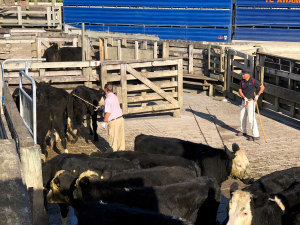M.I.A.
OPINION: The previous government spent too much during the Covid-19 pandemic, despite warnings from officials, according to a briefing released by the Treasury.
 Both the Frankton and Stratford sales were very successful, according to NZ Farmers Livestock general manager, Bill Sweeney.
Both the Frankton and Stratford sales were very successful, according to NZ Farmers Livestock general manager, Bill Sweeney.
After weeks of silence, the Frankton sale yards were bustling with yards of stock up for auction on Wednesday.
The sale marks the restart of NZ Farmers Livestock auctions and saw a hybrid of in-yard bidding, along with on-line bidding.
The Frankton sale is the first of four across the country within the next week. Stratford ran very well the next day with a complete clearance. Morrinsville, and Te Kuiti restart next week with Rongotea the week after. Normal saleyard and other advertised yard and on-farm sales continue from there.
Bill Sweeney, NZ Farmers Livestock general manager, said both the Frankton and Stratford sales were very successful with both in-yard and on-line bidders competing for stock in a seamless, real-time manner.
“The safety of everyone involved in livestock sales is a constant focus and we devoted a huge amount of time over several weeks ensuring COVID-19 safety for all participants.
“Having proven that the Level 3 COVID-19 safety arrangements we developed are keeping people safe, NZ Farmers Livestock is now working to bring this capability to other livestock saleyards, and scheduling on-farm sales using the hybrid bidding options.
“There was a very high clearance of the stock on sale at Frankton and we were pleased with prices in what has become a very uncertain market. Sale details will support wider price discovery within the industry, and this performance and level of successful sale completion reinforces the importance of saleyard and on-farm auctions for farmers, particularly when compared to the relatively poor results from the on-line only alternative platforms.”
“A huge team effort brought together the technical capability to support real auctions in NZ with on-line bidding capability with the protocols, arrangements and attendee behaviours to ensure a COVID-safe and successful sale,” Sweeny says.
“This restart under Level 3 has come in the nick of time for a lot of dairy farmers, with many still needing to sell part or whole dairy herds before the June changeover and start of the 2020-21 season.”
New Zealand and Chile have signed a new arrangement designed to boost agricultural cooperation and drive sector success.
New DairyNZ research will help farmers mitigate the impacts of heat stress on herds in high-risk regions of the country.
Budou are being picked now in Bridge Pā, the most intense and exciting time of the year for the Greencollar team – and the harvest of the finest eating grapes is weeks earlier than expected.
The Real Estate Institute of New Zealand (REINZ) has released its latest rural property report, providing a detailed view of New Zealand’s rural real estate market for the 12 months ending December 2025.
Rural retailer Farmlands has released it's latest round of half-year results, labeling it as evidence that its five-year strategy is delivering on financial performance and better value for members.
OPINION: "We are back to where we were a year ago," according to a leading banking analyst in the UK, referring to US president Donald Trump's latest imposition of a global 10% tariff on all exports into the US.

OPINION: A mate of yours truly reckons rural Manawatu families are the latest to suffer under what he calls the…
OPINION: If old Winston Peters thinks building trade relations with new nations, such as India, isn't a necessary investment in…